Programs
Cribs for Kids®
Cribs for Kids® Coordinator
Courtney Rapone
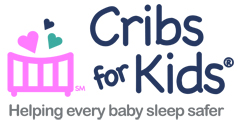
Make a Referral
By Email: CDRC@delaware.gov — Download Referral Form
Individuals cannot self-refer. Cribs for Kids® will only receive referrals from professionals for mothers residing in Delaware.
The Cribs for Kids® program provides both education on safe-sleep practices as well as a safe crib for those in need.
Are you a social worker, nurse, or health care provider in the State of Delaware? Do you know a new or expectant mother in need of a safe crib for her baby?
The Cribs for Kids® program offers a free crib to parents who meet the following requirements:
- The family does not have the financial means to purchase a crib on their own
- A safe crib IS NOT available for their baby
- The mother's due date is in less than six weeks
- Or the baby is less than twelve months of age per the American Academy of Pediatrics guidelines.
Forms to use:
Since 1998, through the donation of thousands of cribs, National Cribs for Kids® has been making an impact on the rate of babies dying of SIDS and from accidental suffocation. Cribs for Kids® is a safe-sleep education program to help reduce the risk of injury and death of infants due to unsafe sleep environments. Currently, Cribs for Kids® has 310 partner programs in 43 states throughout the country that provide a Graco Pack 'n Play® crib and educational materials regarding safe sleeping and other important safety tips.
In June 2009, a partnership was developed between the Delaware Division of Public Health, Nemours Health and Prevention Services of the Nemours Foundation (Nemours), Christiana Care and CDRC to implement the first Cribs for Kids® program in Delaware. As a result of this program, a crib is provided to any Delaware mother if she is unable to purchase a crib on her own and meets the following criteria: is due to deliver the baby within six weeks or the infant is younger than six months of age; and the family has not previously received a crib from the program. The first crib was distributed in November 2009. This program is one of the biggest accomplishments from the infant safe sleeping community action team.
On December 23, 2011, CDRC assumed more responsibility for this program and became the gatekeeper for all crib distribution. The designated new telephone number is (302) 255-1743. The education will be provided to the family by a Division of Public Health nurse or other trained staff within the community. The preventive part of the program is the education that must be given by the nurse on unsafe sleeping practices for infants. Delaware is the only state that offers this education in the home, and has been recognized by national leaders as the gold standard versus the client picking up the crib at an office or facility. Cribs for Kids® is an evidence-based program that has had successful outcomes in other states in reducing infant unsafe sleeping deaths and is an excellent example of collaborative partnerships in Delaware on behalf of children. This program is completely funded through grants, monetary donations, and fundraising efforts.
DOSE™ - Direct On Scene Education
The CDRC and the Delaware Perinatal Cooperative (under the auspices of the DHMIC) in collaboration with the Wilmington Fire Department (WFD) have launched a state wide Infant Safe Sleep initiative entitled DOSE™. DOSE™ is a program developed by Lt. James Carroll of Fort Lauderdale Fire Rescue and Jennifer Coombs, MSN, ARNP Coordinator for Healthy Mothers, Healthy Babies Coalition of Broward County, Florida.
Funded by the Delaware Medical Education Foundation and the Delaware SIDS Affiliate, the purpose of the program is to provide first responders with the knowledge and the tools needed to understand SUID (Sudden Unexpected Infant Death), reduce the risk for Sudden Infant Death Syndrome (SIDS), and to prevent accidental sleep related infant deaths by helping families make the sleep environment safe for infants in the communities they serve.
First responders have access to homes and residents that healthcare professionals do not. Families view first responders as authority figures they can trust. It is because of this open access and trust, that first responders are in the ideal position to educate and facilitate positive behavioral changes.
In October 2013, Lt. Carroll trained over 175 first responders from the City of Wilmington, New Castle County EMS, St. Francis EMS, and Kent and Sussex EMS, as well as provided "train the trainer" courses at the Wilmington Fire Department and the Delaware State Fire School. First responder training occurred at the Wilmington Fire Department, St. Francis Hospital and the Delaware State Fire School. The "train the trainer" course will ensure that all recruits will receive the DOSE™ education as part of their training/education.
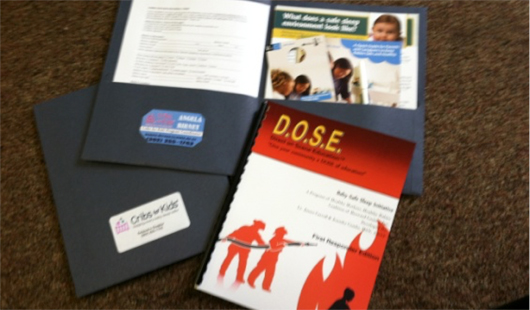
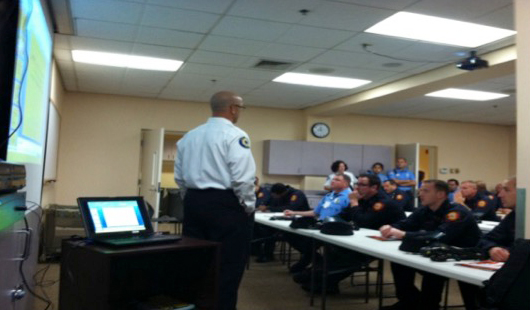
DOSE™ -Training at the Wilmington Fire Department
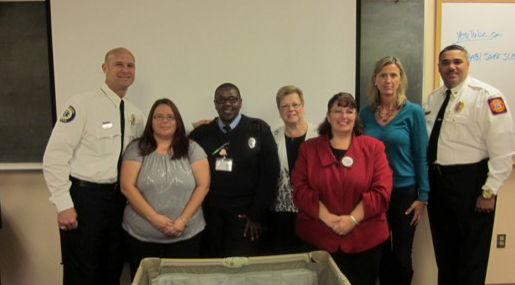
From Left to Right: Lt. James Carroll, Angela Birney, Beverly Wilcher, Marjorie Hershberger, Anne Pedrick, Bridget Buckaloo, and Fire Chief Anthony Goode.
Cops 'n Cribs
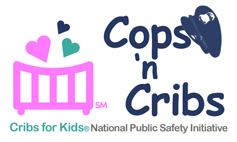
After hearing about the DOSE™ program, the New Castle County Police Department reached out to CDRC to participate in a similar education program. The Cops and Kids program was modeled after the DOSE™ program as information (safe sleep kit) is provided by law enforcement when responding to a complaint in the community when an infant is present. Lt. Teresa Williams trained all New Castle County Police roll call shifts utilizing the Cops and Kids short eight minute video and provided "safe sleep kits" similar to the DOSE™ program but not utilizing their branding.
Activities
- Identify and triage cases for review.
- Prepare and review child death cases that meet the statutory criteria for review.
- Make recommendations to decrease child mortality.
- Collect and analyze data related to child deaths.
- Issue annual reports and expedited review reports outlining recommendations and data.

